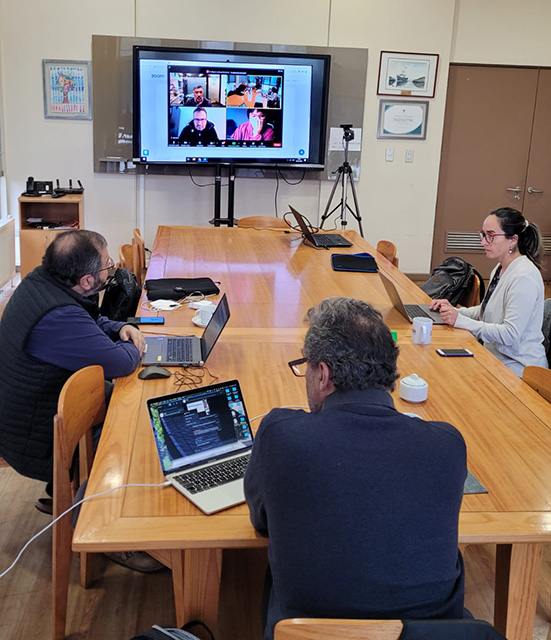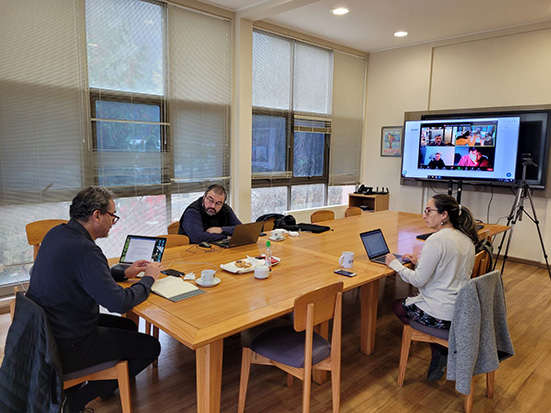
Nine scientific research centers of excellence signed a declaration of joint work to study the importance of the ocean in the exchange of greenhouse gases and the state of the microbial community, in order to develop tools to reduce the impact of climate change in Chile and the world.
The consortium of research centers of excellence behind the CEODOS Chile, composed of the Centro COPAS Sur-Austral/COPAS Coastal, the Center for Mathematical Modeling (CMM) of the University of Chile; the Center for Climate Science and Resilience (CR2), the Center for Genome Regulation (CRG), the Center for Research on Patagonian Ecosystems (CIEP), the Center for Dynamic Research of High Latitude Marine Ecosystems (IDEAL), the Interdisciplinary Center for Aquaculture Research (INCAR) and Inria Chile, met for the first time this year, after the scientific sailing ship Tara traveled the Chilean coast from south to north to assess the health of the coastal ocean and help understand the effects of climate change.
In the hybrid meeting held at the COPAS center of the Universidad de Concepción, the directors of the associated centers learned about the current status of the mission, shared the data collected with the consortium and discussed the future work plan, as well as the upcoming publications related to the CEODOS-Chile project.
During the meeting, led by the national coordinators of CEODOS-Chile, the director of COPAS Coastal, Dr. Camila Fernández, and the researcher and director of International Relations of the Center for Mathematical Modeling (CMM), Dr. Alejandro Maass, the directors of the centers declared their willingness to sign an agreement that will give long-term continuity to the initiative, which includes scientific research, technology transfer, ocean education and training of advanced human capital.

Through the signing of this agreement, the centers commit to form an interdisciplinary group on marine, environmental, genomic, mathematical modeling and artificial intelligence issues and to work together to provide the country, on a regular basis, with a comprehensive assessment of planktonic diversity (from viruses to zooplankton) in the Chilean coasts.
According to the signed declaration, CEODOS-Chile seeks to quantify the carbon currently being fixed by the Chilean ocean and its role in the exchange of greenhouse gases from the southern waters to the extreme north of Chile. It also aims to map microbial and planktonic diversity, identifying species with the potential to contribute to decision-making to help society adapt to climate change. As a third goal, CEODOS-Chile proposes the slogan Communicate to change, integrating the general community of Chile in the effort to understand the importance of a healthy ocean for climate change and the sustainability of hydrobiological resources.

The meeting was attended in person by the director of the INCAR Center, Dr. Renato Quiñones, and remotely by the Executive Director of CIEP, Dr. Giovanni Daneri; the director of the IDEAL Center, Dr. Humberto González, the researcher of CR2, Dr. Laura Farías, and the director of Inria Chile, Dr. Nayat Sánchez-Pi. The participation of the CRG was represented by Dr. Alejandro Maass, who is a researcher at the center.
Check the full statement below:
Statement
The microscopic marine world is closely related to the water cycle and climate, which is why it is already beginning to be part of the global conversation. Chile, having a long coastline that crosses a diversity of terrestrial and marine ecosystems, is a true natural laboratory to investigate global change and contribute to decision-making based on science and technology.
Therefore, the undersigned centers declare their willingness to sign an agreement that will give continuity to the CEODOS-Chile program, which includes scientific research, technology transfer, ocean education and training of advanced human capital. The CEODOS-Chile program seeks to:
- quantify the carbon currently being fixed by the Chilean ocean and its role in the exchange of greenhouse gases from the southern waters to the extreme north of Chile;
- mapping microbial and planktonic diversity, identifying species with the potential to contribute to climate change mitigation; and
- Communicate for change, integrating the general Chilean community in the effort to understand the importance of a healthy ocean for climate change and the sustainability of hydrobiological resources.
To quantify the physiological state of organisms responsible for the absorption of CO2 and other greenhouse gases in the ocean, the centers will integrate an interdisciplinary group on marine, environmental, genomic, mathematical modeling and artificial intelligence issues and will work together to provide the country with a comprehensive periodic assessment of the Chilean coast of planktonic diversity (from viruses to zooplankton). Thus, the centers will take advantage of their scientific, technological and human synergies in order to develop tools of impact for Chilean society and the world.
- Dr. Alejandro Maass, CMM/CRG
- Dr. Renato Quiñones. INCAR
- Dra. Laura Farías, CR2
- Dr. Giovanni Daneri, CIEP.
- Dr. Humberto González, IDEAL
- Dra. Nayat Sánchez-Pi, Inria Chile
- Dr. Silvio Pantoja, COPAS Sur-Austral
- Dra. Camila Fernández, COPAS Coastal


Posted on Apr 26, 2022 in News




 Noticias en español
Noticias en español
